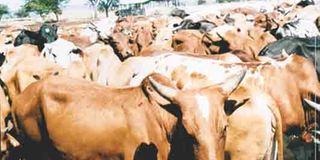Tackle livestock hurdles, govt told

What you need to know:
Figures released in the 2017/18 budget of the Ministry of Agriculture, Livestock and Fisheries showed that the industry’s performance declined in 2016/17.
Dar es Salaam. The government has been urged tackle to challenges facing livestock industry to raise its contribution to the national economy.
Figures released in the 2017/18 budget of the Ministry of Agriculture, Livestock and Fisheries showed that the industry’s performance declined in 2016/17.
The situation has galvanised stakeholders into demanding plans to be put into practice.
The government has insisted that it is creating a favourable business environment for livestock keepers to implement the 2016 Tanzania Livestock Master Plan.
The ministry’s policy advisor, Mr Revelian Ngaiza, says the master plan provides sound solutions to chronic challenges and the government is aware of the problems such as conflicts pitting herders against smallholder farmers, climate change and low productivity.
It also provides links with other ministries such as water, lands, and natural resources.
“We will continue to educate livestock keepers on the importance of adopting modern livestock practices.”
As the government is undertaking an industrialization drive, livestock production should be improved, more abattoirs built, diary industries established and beef processing factories constructed, according to him.
Agribusiness consultant Ebron Mwakalinga believes it is wrong to treat livestock as an economic entity rather than combing it with the socio-cultural context.
“The absence of sound solutions has continued to hurt livestock production. That is why herders and other people have been complaining,” says Mwakalinga.
He also talks about the need to mobilise more investments from livestock keepers themselves and transform their pasture lands into modern and productive ones.
Although Tanzania is the third largest livestock keepers after Ethiopia and Sudan, the industry’s exports have been lower than those of Djibouti and Somalia, which exports large numbers goats to the Middle East, he says.
“There is also a need to encourage commercial livestock keepers to work with non-commercial operators to improve productivity through providing extension services, constructing livestock infrastructure and establishing associations,” he says.
According to him, the performance of livestock research institutes must be measured by the number of livestock keepers who have abandoned bad practices such as nomadic pastoralism and overstocking.
The minister for Agriculture, Livestock and Fisheries, Dr Charles Tizeba, said in his 2017/18 budget speech that per capita consumption for meat was 13 kilos, 17 litres of milk and 106 eggs annually.
The 2011 data compiled by the UN Food and Agricultural Organisation indicates that the country’s per capita consumption was 50 kilos of meat, 200 litres of milk, and 300 eggs.
However, the ministry says milk production declined from 2.14 billion litres in 2015/16 to 2.09 billion litres in 2016/17.
The amount of processed milk in 75 factories has declined from 61.18 million litres to 40.13 million during the same period while the meat production fell from 648,810 tonnes to 558,164 tonnes.
Dr Tizeba attributes the trend to declines in production to drought.




